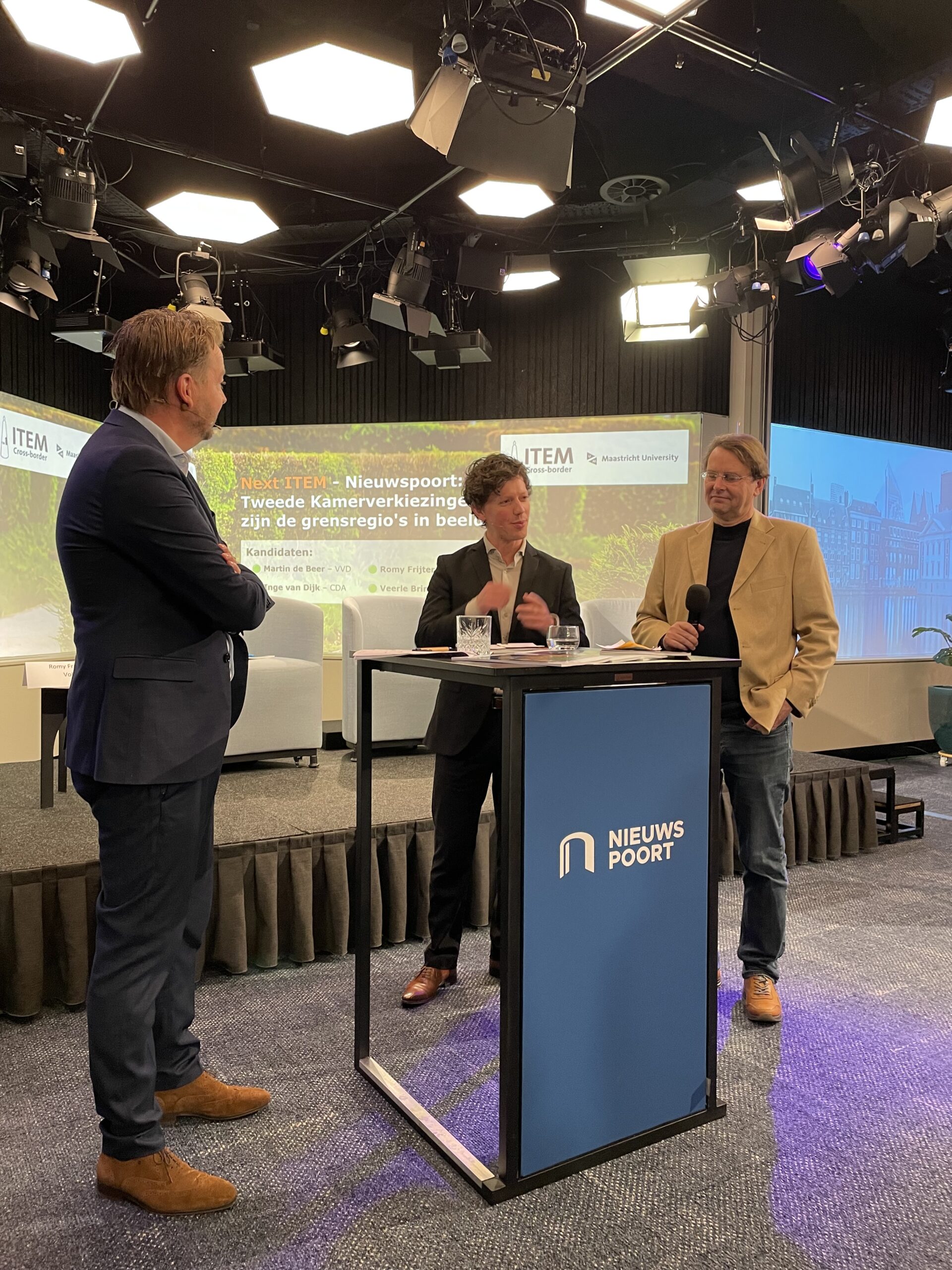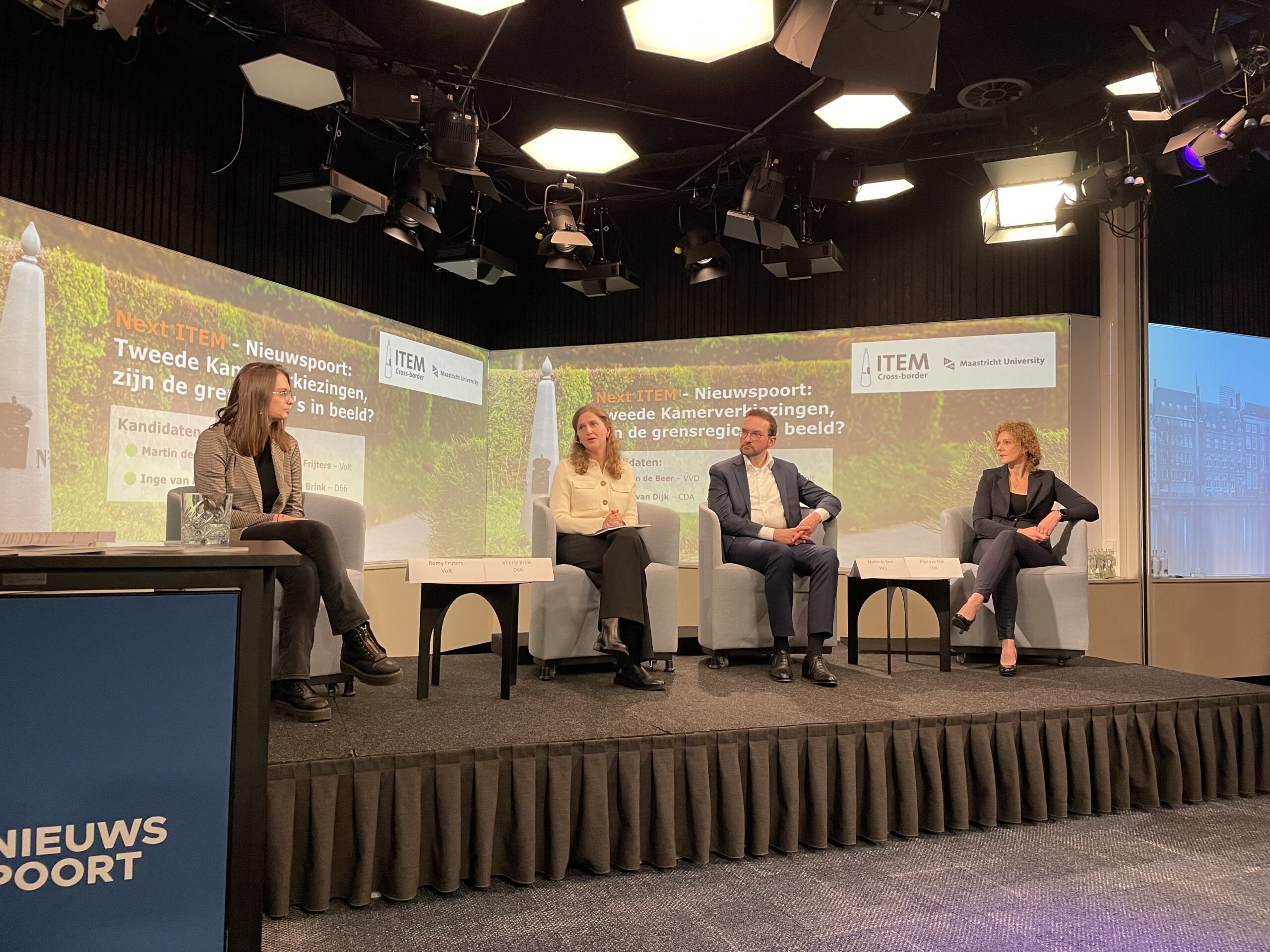Cross-border cooperation is not a given and requires continuous attention and investment, a concrete approach and sometimes requires tailor-made adjustments for the region because, after all, every region counts!
ITEM analysed the plans of the 15 largest parties in the light of cross-border cooperation and the future of border regions. What are the plans for the relationship between the state, region and neighbour in terms of labour market, care and welfare, broad prosperity, energy transition and mobility? What are the effects for the border regions? Are there issues we are missing? To map that out, ITEM analysed the plans of the parties participating in the Lower House elections and reflects on them from a cross-border perspective: ITEM Reflection: Lower House Elections from a Cross-Border Perspective
Although most party programmes pay attention to border regions and cross-border cooperation , only few parties pay more attention to this and describe the challenges on the border in more detail. Thematically, the analysis shows that especially policy review for the (border) region, cross-border rail links and security feature a lot in the party programmes . But when asked the question “how?”, many programmes remain more abstract. Cross-border cooperation does not come naturally, it requires cross-border governance structures and instruments. ITEM’ s call to the coalition agreement is therefore for more concrete actions and decisiveness for cross-border cooperation.
Curious about the conclusions? Download the reflection
Candidate MPs
On Thursday 16 November, we discussed the results of this reflection during the event NEXT ITEM – NEWSPOORT: Lower House elections, are the border regions in the picture? During a lively discussion, we talked to candidate MPs Martin de Beer, Inge van Dijk, Romy Frijters and Veerle Brink about cross-border cooperation and the perspective of the border region. Are the border regions on the minds of the candidate MPs?
Unanimously, the candidates expressed the need for a greater focus on border regions and cooperation with neighbouring countries. “Border regions as gateways to Europe,” said Veerle Brink. Central to ITEM’s analysis was the mostly unanswered question of “how” cross-border cooperation can provide solutions and opportunities in the border region. For example, the European Commission is working on a BridgEU initiative to address border barriers more effectively. Candidates endorsed a similar tool, it should be possible to derogate for border regions if necessary. Inge van Dijk: “I don’t understand why it is not yet regulated for frontier workers.”
The Hague-oriented Chamber should pay much more attention to the border region, and test decisions for border effects. A message, which was expressed unanimously by the candidates. And the Hague Chamber should be able to make an important contribution: “The moment you have that cross-border view and that European view that we as Volt would like to promote, you are limited in what you can do, especially from local politics. There are certainly also many opportunities to make a difference in this from The Hague,” said Romy Frijters. But ITEM noted in its analysis that border impact assessment still needs a lot of attention in practice. It requires not only an obligation on paper, but also awareness, capacities and resources. “It also requires expertise, understanding what is happening now in such a border region and I think that is also something that needs to be developed and that also doesn’t happen overnight,” Veerle Brink said.
Border impact assessment
The importance of border impact assessment was also evident from the analysis of the party programmes and proposals themselves. For instance, candidates regularly indicated that they had not considered the various cross-border aspects that ITEM examined. Zooming in on possible border effects through their own proposals in the party manifestos, themes such as energy transition, labour and study migration and infrastructure were discussed. The ITEM analysis indicated a trend of the border as a steering tool, for instance in limiting inflow (EU and non-EU) labour and study migrants. Specifically, this question was addressed to Martin de Beer, where the VVD wants fewer EU students at Dutch educational institutions. Martin de Beer: “There are regions that could well use the dynamism of foreign students.” “Zoom in on regional needs and their earnings model. We need to have a good conversation about the contribution that Maastricht University also makes to the regional economy, that international students can make to that regional economy, that we need to substantiate that even better, also from that region itself, and tell that story much better in The Hague too.”
But attention to the border-specific situation applies to numerous dossiers, for example in the case of nuclear energy, no party refers to the situation and coordination with the neighbouring country. “Nuclear energy, has there been any coordination with foreign countries on this at all? So it’s not really top-of-mind.”
“My message to you, candidate MPs, is not just to watch and hear what others tell you about the challenges in border regions. The task is yours precisely to question what you have done with the border effects test. Answer that, have you recognised that, because otherwise you’ll just keep waiting. Furthermore, I would very much like to suggest looking at the resident of the border region as an independent position in the whole when it comes to policy-making in terms of legislation and regulations, because if you keep that in mind, you can really help the border regions move forward.” With this message, Anouk Bollen closed this meeting.
Watch the event back on YouTube






